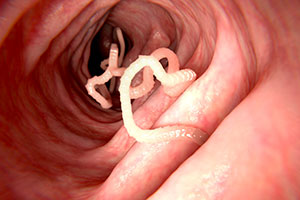Tapeworm Treatment in Beverly Hills, CA

Have you been struggling with diarrhea, fatigue, malnutrition, or reduced appetite? Do you regularly work with animals, or have you recently traveled to a less-industrialized nation? You may have a tapeworm, a type of intestinal parasite found in contaminated food or soil. More than 100 million cases of tapeworm infections are diagnosed globally every year.
While many people with a tapeworm show no symptoms, others suffer more serious effects. If you suspect you’ve picked up a tapeworm, speak with your healthcare provider to diagnose and choose treatment for, or rule out a parasite infection.
To speak with a tapeworm specialist today in Beverly Hills, call (424) 365-1800 or contact Dr. Jeremy Fischer online.
What Are the Symptoms of Tapeworm Infections?
Many people infected with tapeworms experience no symptoms. However, there are over 20,000 species of tapeworms, and while some cause no symptoms in humans, others can cause severe symptoms and dangerous medical complications .1
General tapeworm infection symptoms include:
- fatigue
- abdominal pain
- passing parts of the tapeworm in your feces
- weight loss
- diarrhea
- nausea and vomiting
- intestinal inflammation
- reduced appetite
- dizziness
- malnutrition
- vitamin B12 deficiency (rarely)
- intestinal blockage (rarely)
- bile or pancreatic duct blockage (rarely)
What Causes Tapeworm Infections?
In most cases, people get infected with a tapeworm after consuming food or water containing tapeworm eggs or larvae, or after handling contaminated animals or soil.
When tapeworm eggs enter the stomach, they hatch into larvae. These larvae then travel into or outside the intestines and can infect other parts of the body. Occasionally a tapeworm makes it to the human intestine and becomes a full-grown tapeworm. As long as the worm's head is attached to your intestinal wall, you are likely to experience problems.
Tapeworm infections are more common among people who regularly work with animals, such ranchers and farmers, and in nations where hygiene and sanitation standards differ from those of more industrialized nations. However, you can also get an infection if your pet has tapeworms and you handle contaminated feces.
There are six types of tapeworms known to infect humans. These are commonly called pork, beef, fish, rat, and dwarf tapeworms.
Pork
Infects people who eat raw pork or pork not cooked thoroughly. It can also be contracted if you eat pork prepared by someone who didn’t follow proper sanitary procedures, i.e., washing hands after using the restroom.
This species can survive up to 25 years in your intestines. While this type typically causes no symptoms, it can cause a complication known as cysticercosis. This occurs when the worm’s larvae migrate and infect your tissues and organs, causing cysts or lesions.
When the larvae infect your brain or nervous system, the condition is called neurocysticercosis. Severe cases of this rare but dangerous condition can cause chronic headaches, confusion, vision problems, meningitis, epileptic seizures, and psychiatric disturbances. In extreme cases, this condition can be fatal.
Beef
Associated with cattle, who get infected when grazing on contaminated vegetation. The tapeworm eggs are then passed to people who consume the infected beef.
Though this tapeworm can grow to a length of 20 feet, it rarely causes symptoms in humans. When symptoms do appear, the most common is simple abdominal pain.
Fish
Found mostly in cold lake regions like Alaska, Canada, and the Great Lakes region of the US, this parasite infects people who eat raw or undercooked freshwater fish. This type can grow up to 45 feet long.
Most people don’t show symptoms of this type, though some patients develop anemia from a vitamin B-12 deficiency. This tapeworm cannot be passed to humans who eat raw saltwater fish such as sushi, as this parasite infects only freshwater fish.
Rat
This type infects people who accidentally ingest parasite insects like fleas or grain beetles. This tiny species causes very mild or no symptoms in people.
Dwarf
This species is the only type that doesn’t require an intermediate carrier host such as a pig, cow, or flea. It can be transmitted hand-to-mouth and typically affects young children. Most people show no symptoms, though diarrhea can occur in severe cases.
A rare condition called echinococcosis, or hydatid disease, occurs in very rare cases. This infection happens when larvae leave the gut and infect your organs, usually the liver. Large cysts form, putting pressure on blood vessels and hindering circulation. In extreme cases, treatment can involve surgery or a liver transplant to avoid the condition from becoming fatal.
If you suspect you’ve been infected by a tapeworm and are showing serious symptoms, don’t wait—call your doctor or seek emergency medical attention right away.
How Are Tapeworm Infections Diagnosed?
First, your healthcare provider will exam you and discuss your symptoms, medical history, and recent travel destinations. If he or she suspects you’ve picked up a tapeworm, these tests can help diagnose it:
- blood test: to identify antibodies caused by infection
- imaging scans: x-ray, ultrasound, MRI, or CT can show up on these imaging tests, helping to identify tapeworms in your intestines
- organ tests: to determine whether your organs are functioning correctly, or whether they’re affected by a tapeworm infection
How Are Tapeworm Infections Treated?
There are many ways to treat tapeworm infections, and your healthcare provider will help you determine which is best for your infection type, duration, and severity. He or she will also take into consideration other health conditions you’re struggling with and medications you’re taking.
Pharmaceutical medications
Pharmaceuticals are most commonly used to kill tapeworms by either starving them or paralyzing them. These medications are usually taken for a few days, followed by a repeat dose two weeks later. Some of the most common medications include:
- Mebendazole, Albendazole, Tiabendazole: prevent worms from absorbing the sugars they need to survive; kill worms but not eggs; side effects include: stomach/abdominal pain, vomiting, diarrhea, fever, headache, dizziness, or drowsiness, ringing in the ears
- Praziquantel and Ivermectin: paralyze and dislodge worms in the intestine so they can be removed from the gut in the stools; rare side effects include: bloody diarrhea, fever, irregular heartbeat, or seizures
- Prednisone or Dexamethasone: these corticosteroids reduce tissue inflammation caused by cysts
Laxatives
Laxatives succeed in expelling a stunned or dead tapeworm through bowel movements about 95% of the time. Don’t attempt this treatment without medical supervision – taking too many laxatives can deplete your body of minerals. Consult with your healthcare provider to determine whether your infection type and severity may respond to this treatment. He or she will also check your stool sample 1-3 months after completing the medication to ensure the tapeworm is gone.
Anti-Parasitic Supplements
Certain herbal supplements have been used globally in traditional medicine for centuries to help kill parasites, as well as rid of the body toxins. Your healthcare practitioner will recommend the best herbs and dosage for your case, which may include a combination of the following:
- anti-parasite cleanse: includes thyme leaf, berberine sulfate, oregano, grapefruit seed extract and uva ursi leaf – anti-parasitic, antifungal, antibacterial herbs
- black walnut: cleanses blood and intestines
- garlic: powerful antifungal that destroys dangerous microorganisms
- wormwood: has strong antimicrobial properties to clear infections
- clove oil: contain eugenol, caryophyllene, and tannins – powerful antimicrobial agents
Possible side effects of these herbal treatment include: nausea, vomiting, diarrhea, stomach cramps, headaches, and flu-like symptoms. Consult with your healthcare practitioner before embarking on any treatment regimen.
Surgery
Surgical removal is necessary only in rare extreme cases. If the tapeworm or its larvae have reached your brain, surgery and medication may be used together to remove the tapeworm safely. Also, if you have life-threatening cysts that developed in vital organs like your liver or lungs, you may require surgery to remove them. Your doctor will inject the cysts with anti-inflammatory medication to destroy the tapeworm larvae before removing the cysts.
Speak with your healthcare provider to determine which treatment options is right for you and your particular type and severity of tapeworm infection.
How Can I Prevent Tapeworm Infections?
While tapeworms are much less common in the US and Europe than in developing nations, taking steps to prevent tapeworm infection is still a good idea. Strategies are straightforward and include:
- good hygiene: washing your hands thoroughly after using the restroom and before eating
- food precautions: in areas where tapeworms are more common, such as Asia, Latin America, Africa, and South America, make sure you wash and cook all foods, including fruits and vegetables thoroughly and in clean water
- livestock: properly dispose of animal and human feces, and minimize your exposure whenever possible
- travel safety: avoid areas contaminated with animal droppings and freshwater bodies like rivers, ponds, and lakes that may contain tapeworm eggs
- meat and fish: cook all meats to at least 150 degrees Fahrenheit (66 Celsius) to kill any present tapeworm larvae; freezing meat for 7 days will kill tapeworm eggs and larvae raw foods: never consume raw or undercooked pork, beef, or fish
- dogs: make sure your dog is treated for tapeworms, and never eats undercooked meat
- kitchen sanitation: make sure all surfaces are regularly cleaned and disinfected
Reserve Your Appointment Now
Though rarer in the U.S. than in other less industrialized countries, tapeworms must be treatment immediately. If you suspect you’ve come into contact with tapeworm larvae and you’re showing alarming symptoms, don’t hesitate—contact your doctor or get emergency medical care immediately.
To speak with a tapeworm specialist today in Beverly Hills, call (424) 365-1800 or contact Dr. Jeremy Fischer online.
1. Caira, Janine, and Kirsten Jensen, editors. "Planetary Biodiversity Inventory (2008-2017): Tapeworms from the Vertebrate Bowels of the Earth”, University of Kansas National History Museum, 2017.
Vitality Integrative Medicine
Address
4849 Van Nuys BlvdSuite 104
Sherman Oaks, CA 91403
(424) 365-1800
www.vitalityintegrative.com
Hours
Mon:
8:00 am - 6:00 pm
Tue:
8:00 am - 6:00 pm
Wed:
8:00 am - 6:00 pm
Thu:
8:00 am - 6:00 pm
Fri:
8:00 am - 6:00 pm
Sat:
8:00 am - 12:00 pm

